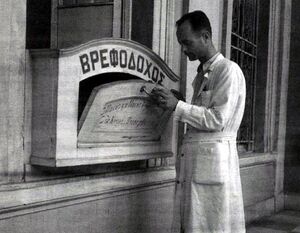βρεφοδόχος
τὸ τῶν γεωργῶν ὅσαι τε ἄλλαι τέχναι (Plato, Timaeus 17c10) → the class of farmers and other such crafts(men)
Greek Monolingual
ο
1. εκείνος που παραλαμβάνει το βρέφος
2. το θηλ. ως ουσ. θήκη, κούνια έξω από βρεφοκομείο όπου τοποθετούνται τα έκθετα βρέφη.
[ΕΤΥΜΟΛ. < βρέφος + -δόχος < δέχομαι. Η λ. μαρτυρείται από το 1866 στον Αναστ. Ζίννη].
Μεγάλη Ελληνική Εγκυκλοπαίδεια
Βρεφοδόχος. Κιβώτιον ευμέγεθες δυνάμενον να χωρεί έως δύο βρέφη εξηπλωμένα. Το τοιούτον εντοιχίζεται παρά την εξώθυραν των βρεφοκομείων προς τον σκοπόν να εκτίθενται εν αυτώ κρυφά τα δι' ένα οιονδήποτε λόγον απορριπτόμενα ή εγκαταλειπόμενα νεογνά ή βρέφη. Ως δε ήθελεν αποτεθεί εκεί το παιδίον αυτόματος ηλεκτρικός κώδων αγγέλλει την πράξιν ταύτην της εγκαταλείψεως
Wikipedia EN
A baby hatch or baby box is a place where people (typically mothers) can bring babies, usually newborn, and abandon them anonymously in a safe place to be found and cared for. This kind of arrangement was common in the Middle Ages and in the 18th and 19th centuries, when the device was known as a foundling wheel. Foundling wheels were taken out of use in the late 19th century, but a modern form, the baby hatch, began to be introduced again from 1952 and since 2000 has come into use in many countries, notably in Germany, where there are around 100 hatches, Czech Republic (76), Poland (67), and in Pakistan where there are more than 300 as of 2006.
Translations
ar: صندوق إيداع الطفل المتخلى عنه; bg: бебешка кутия; cs: babybox; de: Babyklappe; en: baby hatch, foundling wheel; eo: bebokesto; fi: vauvaluukku; fr: tour d'abandon; hy: կյանքի պատուհան; it: ruota degli esposti; ja: 赤ちゃんポスト; ko: 베이비박스; lv: glābējsilīte; nl: vondelingenluik; no: babyboks; pl: okno życia; pt: roda dos expostos; ro: trapa pentru copii abandonați; ru: бэби-бокс; simple: baby hatch; sv: bebislucka; uk: бокс для покинутого немовляти; zh: 棄嬰保護艙

